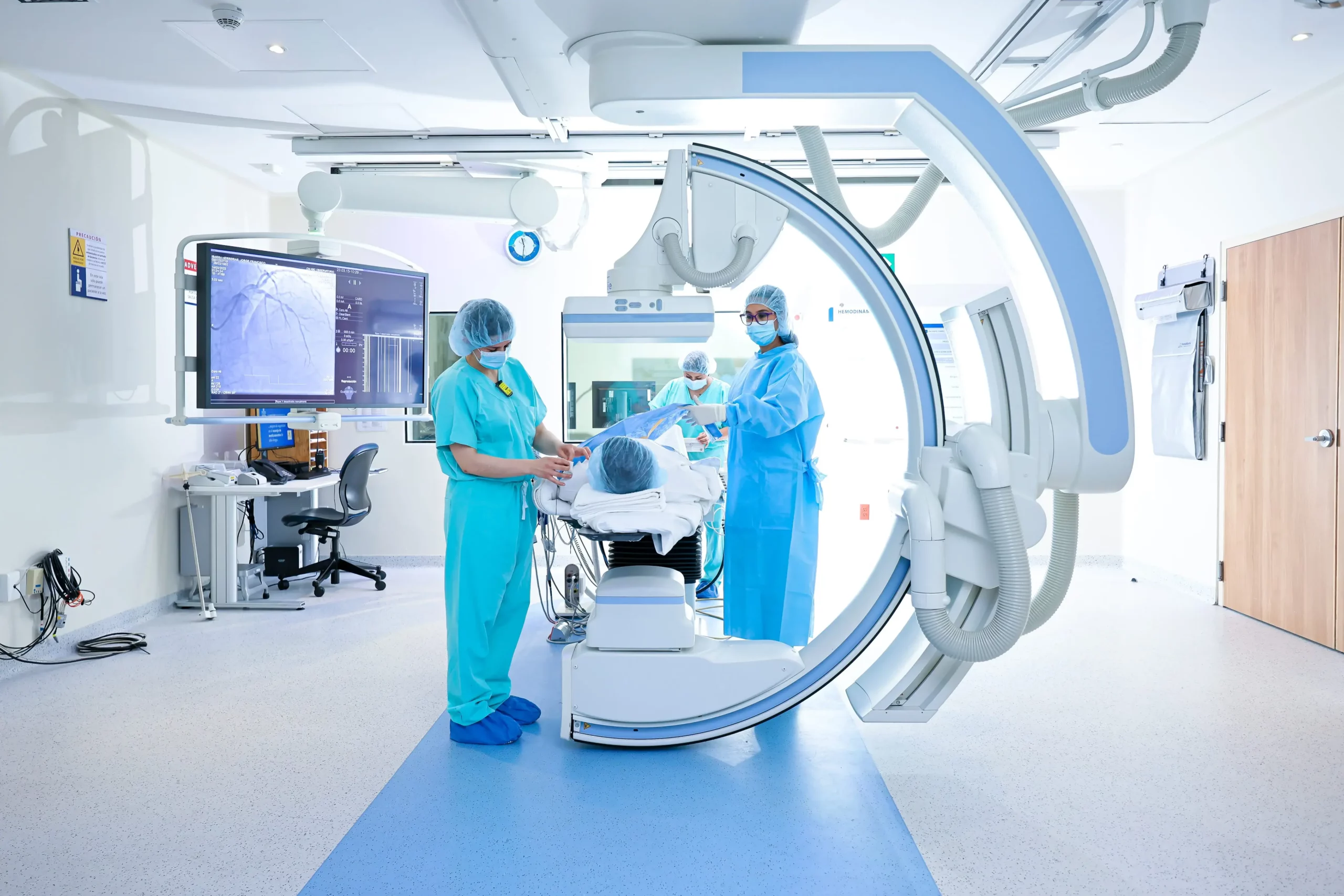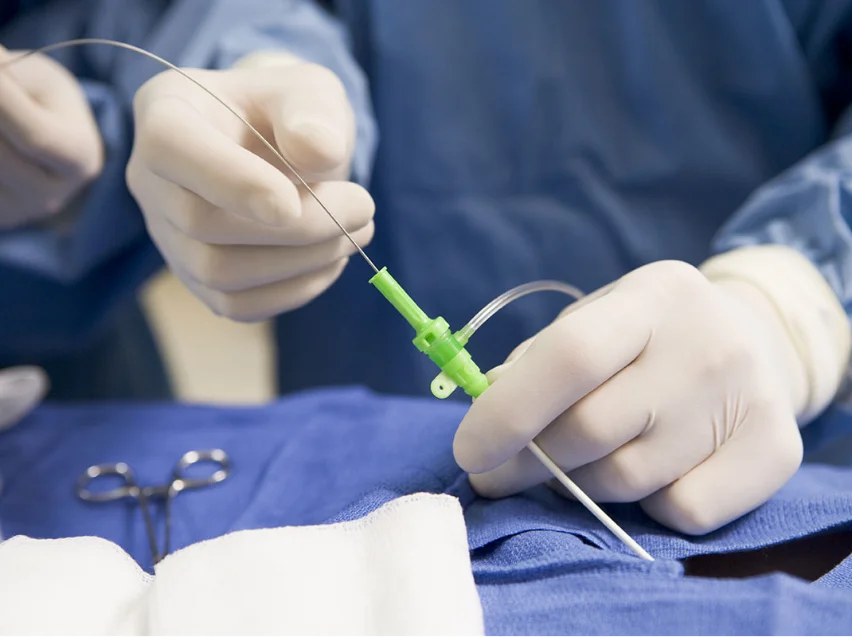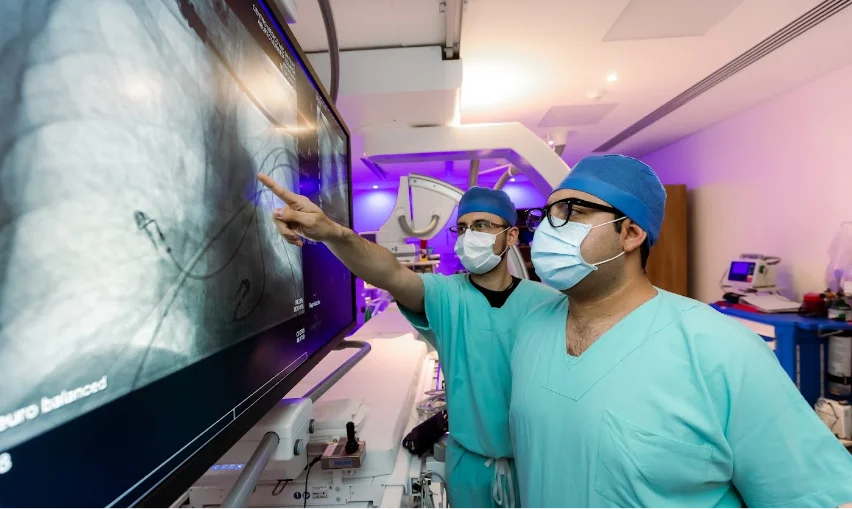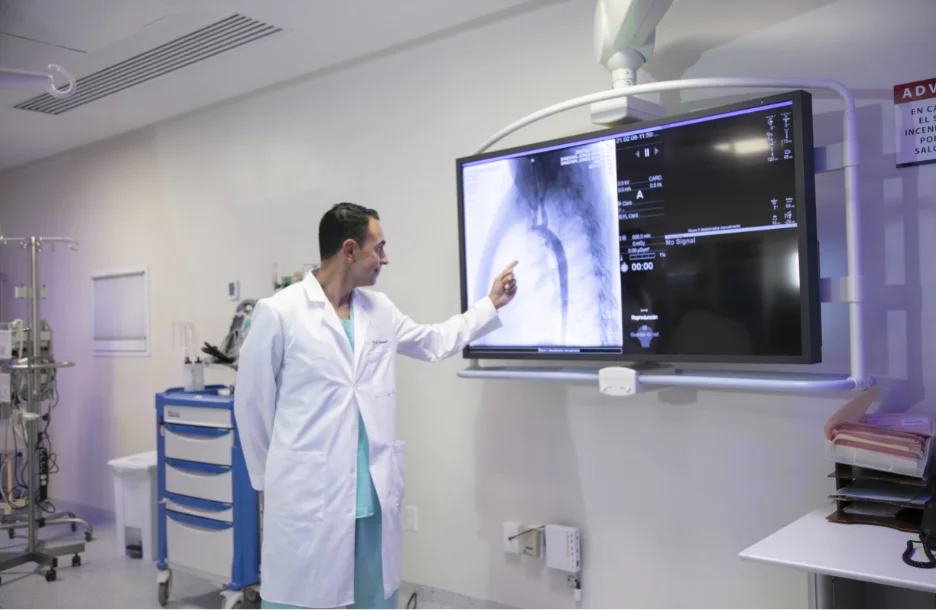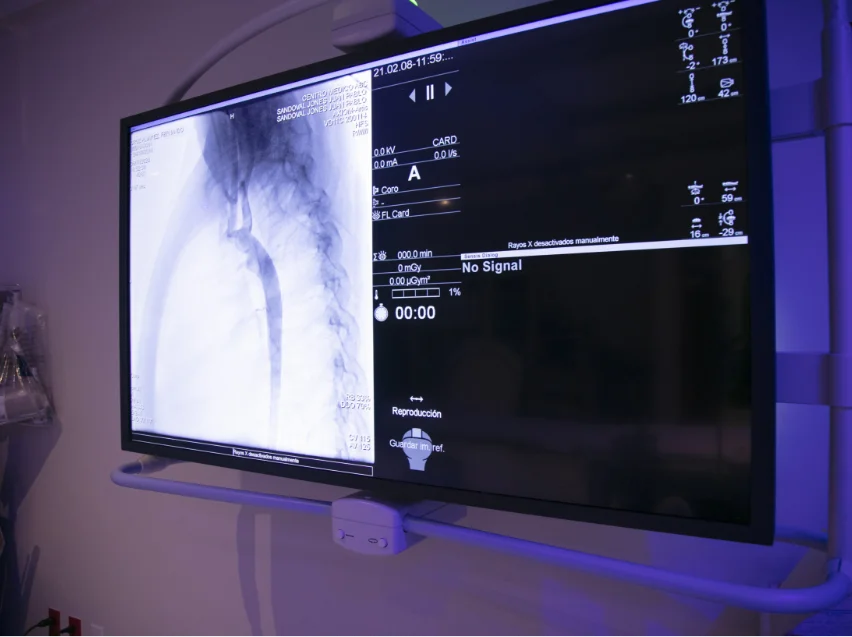Cardiac Catheterization, what is it and what is it for?
Cardiac catheterization is a procedure that is performed in spaces dedicated to the functional anatomical study of the heart, arteries, and veins called “Cardiovascular catheterization rooms (hemodynamics / CATH LAB)”, in which a long, very fine, and flexible catheter is inserted into the bloodstream through a vein or artery and guided to the heart under radiological control. This study provides important information about your heart muscle, heart valves, and heart blood vessels, it can also take arterial and venous blood samples, intracavitary pressures, and very specialized images to diagnose or treat cardiovascular diseases.
The interpretation of the catheterization results depends on the cardiologist or specialist who performs the test. At ABC Medical Center, these procedures are performed by Interventional Cardiologists, physicians specialized in cardiology dedicated to the diagnosis and treatment of cardiovascular diseases through catheters and specialized real-time imaging equipment.
Benefits of the ABC Medical Center’s Hemodynamics Rooms
- Cutting-edge technology
Our Hemodynamic Rooms are equipped with operating room lamps, materials storage, anesthesia and surgical tower, fluoroscopy (or X-ray) equipment, as well as image monitors that allow us to obtain clear and sharp images.
More information
- Análisis funcional de la circulación de los vasos sanguíneos (FFR, IFR, Co-Registro de ultrasonido -Syncvision-).
- Ultrasonido intra cardiaco y de los vasos sanguíneos incluido las arterias coronarias para apoyar la mejor toma de decisiones de diagnóstico y tratamiento.
- Fusión de imágenes (Eco-Navegación, Sincronización de imágenes con otras tecnologías -Tomografía Computada, Resonancia Magnética) que permite tener mayor precisión de la región cardiaca a ser tratada.
- Equipos de aterectomía (taladros rotacionales), litotripsia de obstrucciones calcificadas de las arterias.
- Tecnología para mapeo electro-anatómico indicada para el diagnóstico y tratamiento por radio-ablación de arritmias cardiacas.
- Communication between other specialty areas
By anticipating transfers that require extreme speed at critical moments, our rooms have access to different areas of the medical center. - Multidisciplinary team
Made up of hemodynamists, clinical cardiologists and imaging experts, anesthetists, radiologists, and nursing staff. - Excellent dimensions
Our hemodynamic rooms have enough space to allow the comfortable mobility of our multidisciplinary team around them.
How is catheterization performed
Este procedimiento se realiza en nuestras Salas de Hemodinamia, los médicos y el personal auxiliar y de enfermería utilizan ropa de quirófano para evitar infecciones.
Before cardiac catheterization
- Depending on your medical conditions or the type of procedure, medication is given to help you relax. You may be awake or general anesthesia (fully asleep) may be required.
- Your blood pressure and pulse will likely be checked, electrodes (sticky patches) are placed to monitor your heartbeat.
- Local anesthesia is applied where the catheters are to be inserted, the insertion of the catheter should not be painful and you will not feel it as it moves through your body.
During cardiac catheterization
- Depending on the procedure, one or more catheters are inserted through a blood vessel in the groin, wrist, or neck and guided to the heart.
- A substance (contrast agent) is injected to make the blood visible so that we can study the heart muscle, blood vessels, and heart valves.
- The process is recorded for later analysis and study Different heart tests may be performed, as well as treatments such as coronary stent placement, or tissue removal for analysis. Recovery time is very quick and there is little risk of complications.
During cardiac catheterization
- Depending on the procedure, one or more catheters are inserted through a blood vessel in the groin, wrist, or neck and guided to the heart.
- A substance (contrast agent) is injected to make the blood visible so that we can study the heart muscle, blood vessels, and heart valves.
- The process is recorded for later analysis and study Different heart tests may be performed, as well as treatments such as coronary stent placement, or tissue removal for analysis. Recovery time is very quick and there is little risk of complications.
After cardiac catheterization
- You will probably have to wait in a recovery room for the sedation to wear off. How long you stay in the hospital will depend on your health and the reason for the procedure.
- In general, no aftercare is needed after a catheterization. Tell your doctor if you have any bleeding, bruising, severe pain where the catheter was inserted or elsewhere, or if you have a fever, extreme weakness, or dizziness.
Within our Hemodynamic Rooms, we offer treatment for the following diseases:
- Congenital heart diseases
- Coronary heart disease
- Affectation of the peripheral arterial circulation
- Arrhythmias
- Angina
- Atherosclerosis
Some of the common procedures performed in our catheterization rooms are:
- Coronary angiography
- Cardiac ablation
- Cardiac catheterization
- Balloon angioplasty, with or without stent placement
- Cardiac biopsy
- Repair of congenital heart defects
- Balloon valve replacement
- Heart valve replacement
At the ABC Cardiovascular Center, all our Hemodynamics Rooms have cutting-edge technology.
Endovascular ultrasound
It uses a transducer or probe to generate sound waves and produce images of blood vessels. When used to evaluate the coronary arteries, it can show the entire wall of the artery and provide important information on the amount and type of plaque build-up, which can help determine whether there is cardiovascular risk.
Cardiac catheterization risks
As with most procedures performed on the heart and blood vessels, cardiac catheterization has some risks. However, major complications are rare.
Possible cardiac catheterization risks are:
- Bleeding.
- Clots.
- Bruising
- Damage to the artery, heart, or the area where the catheter was inserted
- Heart attack
- Infection
- Irregular heart rhythm (arrhythmias)
- Kidney damage
- Stroke
- Allergic reactions to contrast agent or medications
Where to Find Us
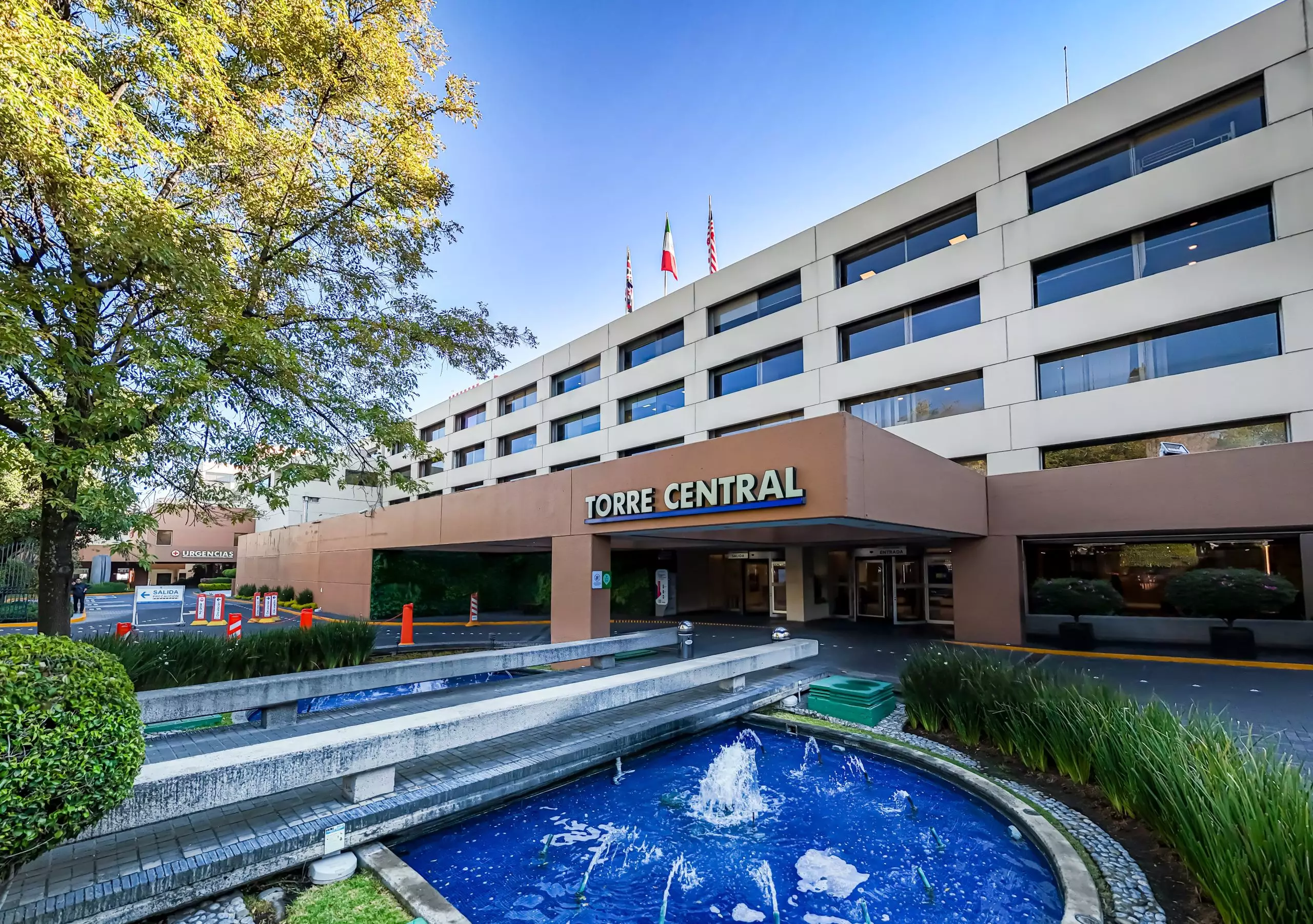
Campus Observatorio
Sur 136 No. 116, Col. Las Américas, Álvaro Obregón, 01120, Cd. de México.
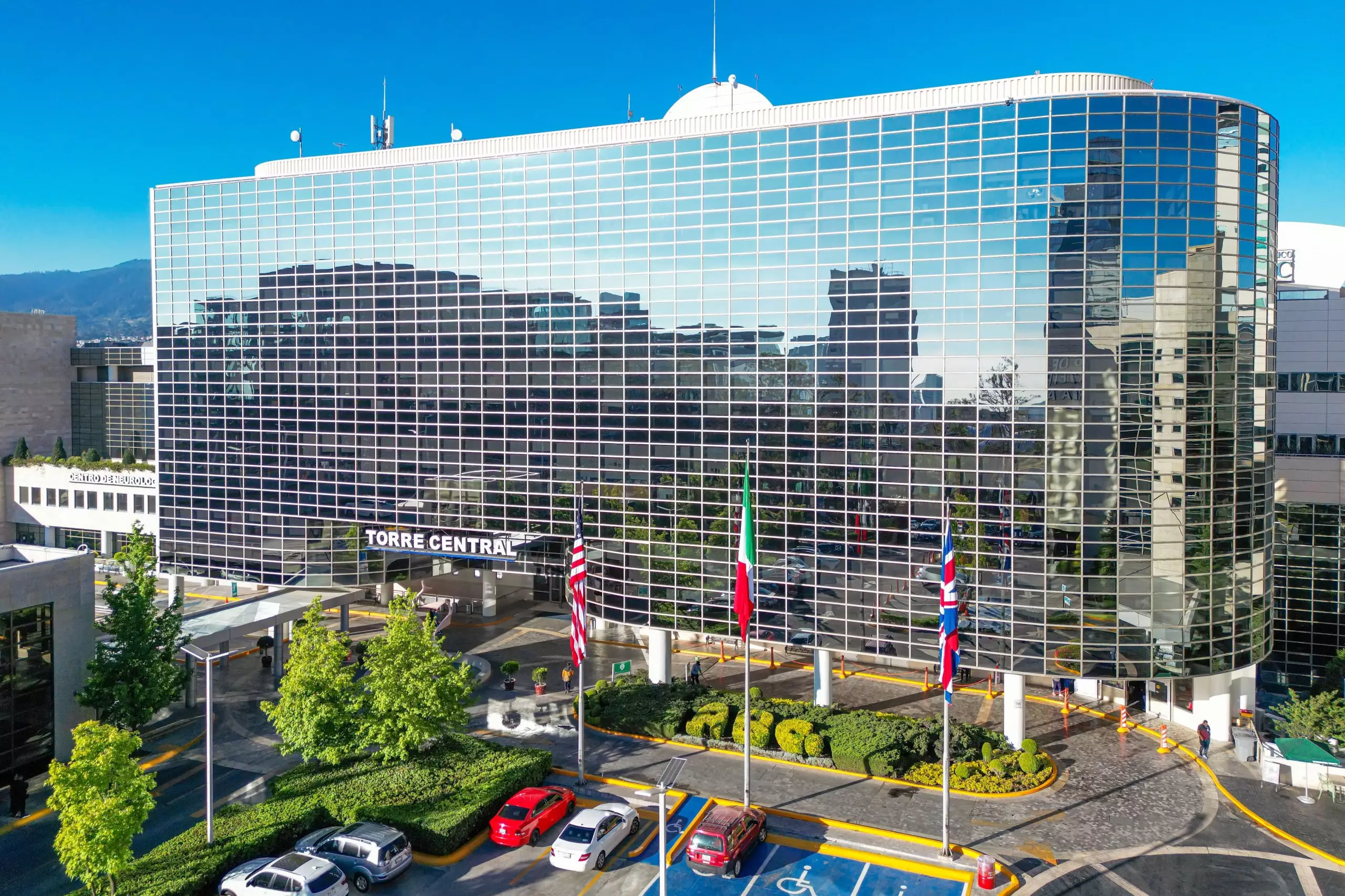
Campus Santa Fe
Av. Carlos Graef Fernández 154, Col. Santa Fe, Cuajimalpa, 05300, Cd. de México.



